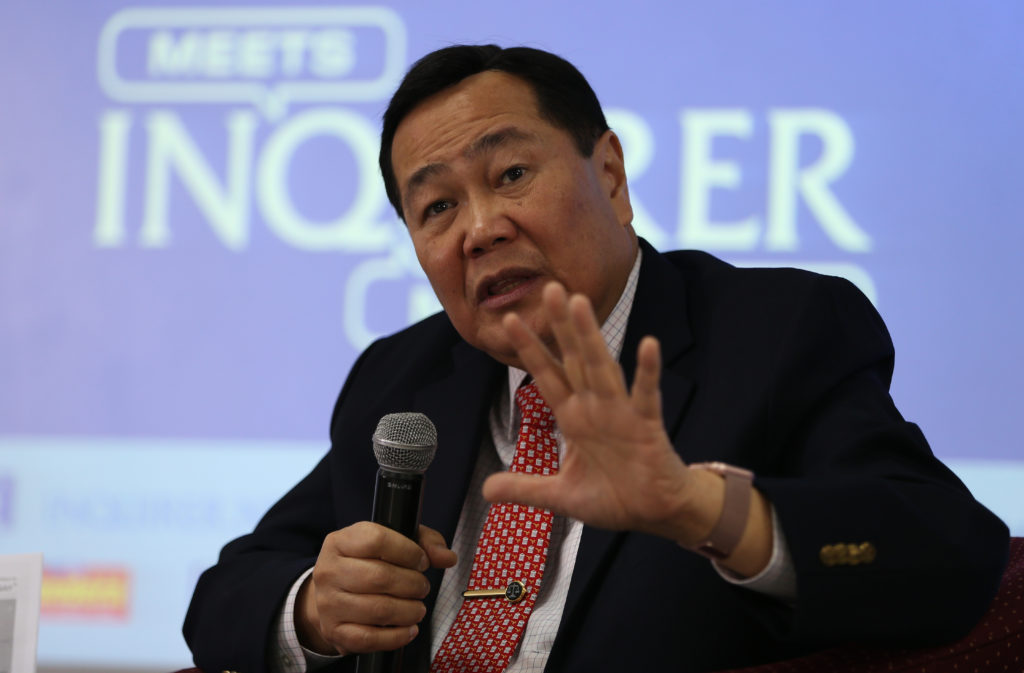The recent Social Weather Stations poll showing that four of five Filipinos rebuffed the government’s approach to the territorial dispute with China proved that President Rodrigo Duterte’s policy was contrary to the public’s position, acting Chief Justice Antonio Carpio said on Sunday.
Carpio, who champions the country’s sovereignty over the West Philippine Sea — waters within the Philippines’ 370-kilometer exclusive economic zone (EEZ) in the South China Sea — said the latest poll also signaled the need for the Duterte administration to rethink its stand on the dispute.
“The Filipino people understand the situation that . . . we have to protect our sovereign rights and we should not allow another country to seize them. They are expressing it in the surveys,” Carpio told the Inquirer in an interview.
‘Overwhelming majority’
“I think the Duterte administration is going one way while the majority of the people want to go another way. So the Duterte administration is going against the wishes of the overwhelming majority of the people,” he said.
The poll, taken from June 27 to 30, also showed that 81 percent of Filipinos believed it was “not right” for the government to allow China’s militarization of Philippine-claimed reefs in the Spratly archipelago.
According to Carpio, the results of the survey were a welcome development, as they were released just two days after the country marked the second anniversary of its victory over China in the Permanent Court of Arbitration in The Hague.
In that ruling, handed down two weeks after the President came to office in 2016, the court declared China’s claim to nearly all of the South China Sea invalid under international law. It also found China violated the Philippines’ sovereign rights to fish and explore for resources in the West Philippine Sea.
But instead of asking help from the international community to enforce the ruling, the President set it aside in exchange for aid and investment from China.
Carpio said continued education would further help raise the Filipinos’ awareness of the importance of the arbitral ruling.
“The survey says the people want to enforce the ruling. It’s very simple. While the President doesn’t want to enforce the ruling, 80 percent of Filipinos want it to be fully enforced,” he added.
‘Protect what is ours’
“It’s just logical and common sense that we protect what is ours. The leaders of the country should protect them as the Constitution says that the state should protect its marine wealth in its EEZ,” said Carpio, a member of the legal team that won the ruling for the Philippines.
“The Constitution says the military is the protector of our EEZ because they are the protector of the state and its territorial integrity. The duty falls on them and the President being the Commander in Chief of the Armed Forces,” he added.
As he had repeatedly said in public speeches, Carpio reiterated that there were “simple ways” for the Philippines to invoke the arbitral decision without necessarily bringing Beijing into the picture.
For one, Carpio said the Duterte administration could enter into a sea boundary agreement with both Malaysia and Vietnam.
It could likewise seek the extension of its continental shelf off the coast of Luzon, he said.
Freedom of navigation
“We should also welcome [these] freedom of navigation [operations] by foreign naval powers. This really enforces the arbitral ruling in the sense that these foreign naval powers are [moving freely on] the the high seas,” Carpio said.
As for the hanging by activists on Thursday of tarpaulin signs on pedestrian overpasses in Metro Manila that proclaimed the Philippines a province of China, Carpio said it was more important to “look at the more substantive matter” of the issue.
“What are we doing now to protect our sovereign rights? That’s the question we should be asking [ourselves],” he said.
“For me, it just highlights that people are already making jokes about the Philippines becoming a province of China,” he added.
